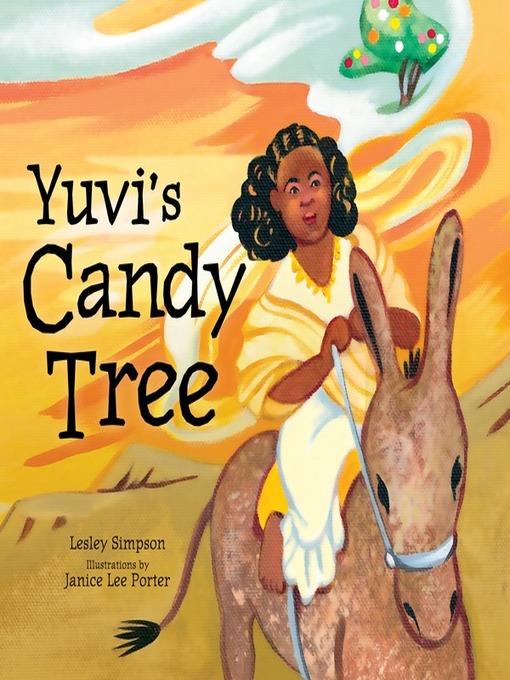
Yuvi's Candy Tree
Israel
فرمت کتاب
ebook
تاریخ انتشار
2014
Lexile Score
470
Reading Level
0-2
ATOS
2.8
Interest Level
K-3(LG)
نویسنده
Janice Lee Porterشابک
9780761371960
کتاب های مرتبط
- اطلاعات
- نقد و بررسی
- دیدگاه کاربران
نقد و بررسی

February 7, 2011
Five-year-old Yuvi narrates her tense exodus from Ethiopia to Israel in this story based on the real-life journey made by Yuvi Tashome, who was among thousands of Ethiopian Jews relocated, secretly at first, to Israel during the 1980s and '90s as part of Operations Moses and Solomon. Simpson (The Purim Surprise) and Porter (Blackberry Stew) convey the hardships faced by Yuvi, her relatives, and the other refugees (they are robbed three times), while providing reassurance in the form of references to the group's unshakable faith in their escape, and swooping, tableau-like paintings rendered in a comforting palette of desert yellows and cool blues. "We have angels with us. We'll fly home," Yuvi's grandmother repeatedly tells her. The eponymous candy tree represents the confidence instilled in Yuvi that a better life awaits (she comes to believe that the orange trees that line the road in Israel are indeed the candy trees she has dreamed of). Though neither the story nor the author's note explicitly state why the refugees are fleeing Ethiopia (mostly famine), readers should finish the book with a strong sense of their strength, faith, and determination. Ages 5–9.

April 15, 2011
The hardship many Ethiopian Jews faced to successfully reach Israel is recounted in the voice of a 5-year-old girl who escapes with her grandmother, determined to reach their destination.
Yuvi's trip begins on a donkey at night with her grandmother's strong religious conviction that angels will help them join mother and baby brother in their real home. "We are going to Jerusalem. We have angels with us. We'll fly home." The long, arduous and dangerous journey is made bearable through role-playing familiar family Shabbat rituals. Several encounters with robbers take almost all their money, except for the small amount Yuvi cleverly hides within her hair curls. Starved and parched from the endless days and nights of traveling, mostly on foot, Grandmother's new promise of unlimited candy, clothes, games and bread is a wonder to Yuvi. Finally when they reach Jerusalem aboard a big plane, Yuvi sees her first orange tree and learns that after picking and eating one, so juicy and sweet, another will grow back—the candy tree she imagined. Large, mostly double-page paintings in soft yellow, tan and blue hues on a textured canvas reflect the intrigue, emotion and difficulty of the journey.
Uncomplicated language expressed in a direct and honest voice plus vibrant illustrations make Israel's Operation Moses easily accessible for early-elementary children. (afterword) (Picture book. 5-8)
(COPYRIGHT (2011) KIRKUS REVIEWS/NIELSEN BUSINESS MEDIA, INC. ALL RIGHTS RESERVED.)

July 1, 2011
Gr 1-3-"I escaped on a donkey in the dark," begins this picture book based on a true story. Five-year-old Yuvi and her family flee war-torn East Africa and make it to a Sudanese refugee camp, where they are aided by Operation Moses, an Israeli rescue program for Ethiopian Jews in the 1980s and 1990s. Depicted in a folk-art style, the story shows the family as they journey for days through the desert with Yuvi strapped onto a donkey with a harness. They face many dangers before reaching the airlift, including robbers who attack repeatedly. But rather than fear permeating the pages, Yuvi's grandmother repeats, "We are going to Jerusalem. We have angels with us. We'll fly home." Her words echo the gentleness of the earth-toned illustrations, which are primitive in style but heartfelt. Yuvi's visions of angels and sweet things to eat lead her to mistake the white rescue workers for celestial beings, and the sweet orange trees in Jerusalem for candy. An innocence that is easily misinterpreted by contemporary ears is a joy to hear. For libraries looking for immigration, Jewish migration, and refugee stories, this is a lovely addition.-Sara Lissa Paulson, American Sign Language and English Lower School PS 347, New York City
Copyright 2011 School Library Journal, LLC Used with permission.

























دیدگاه کاربران